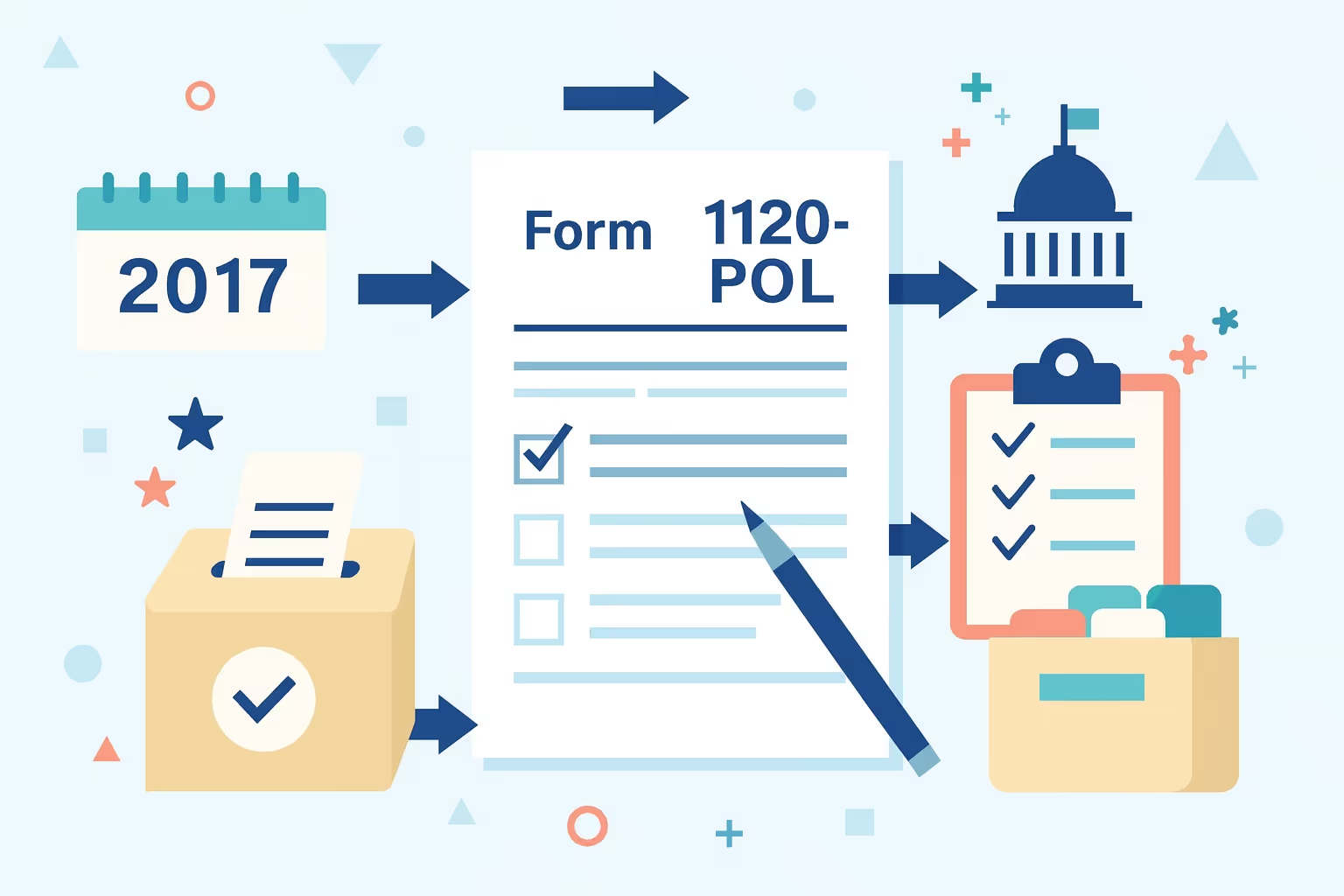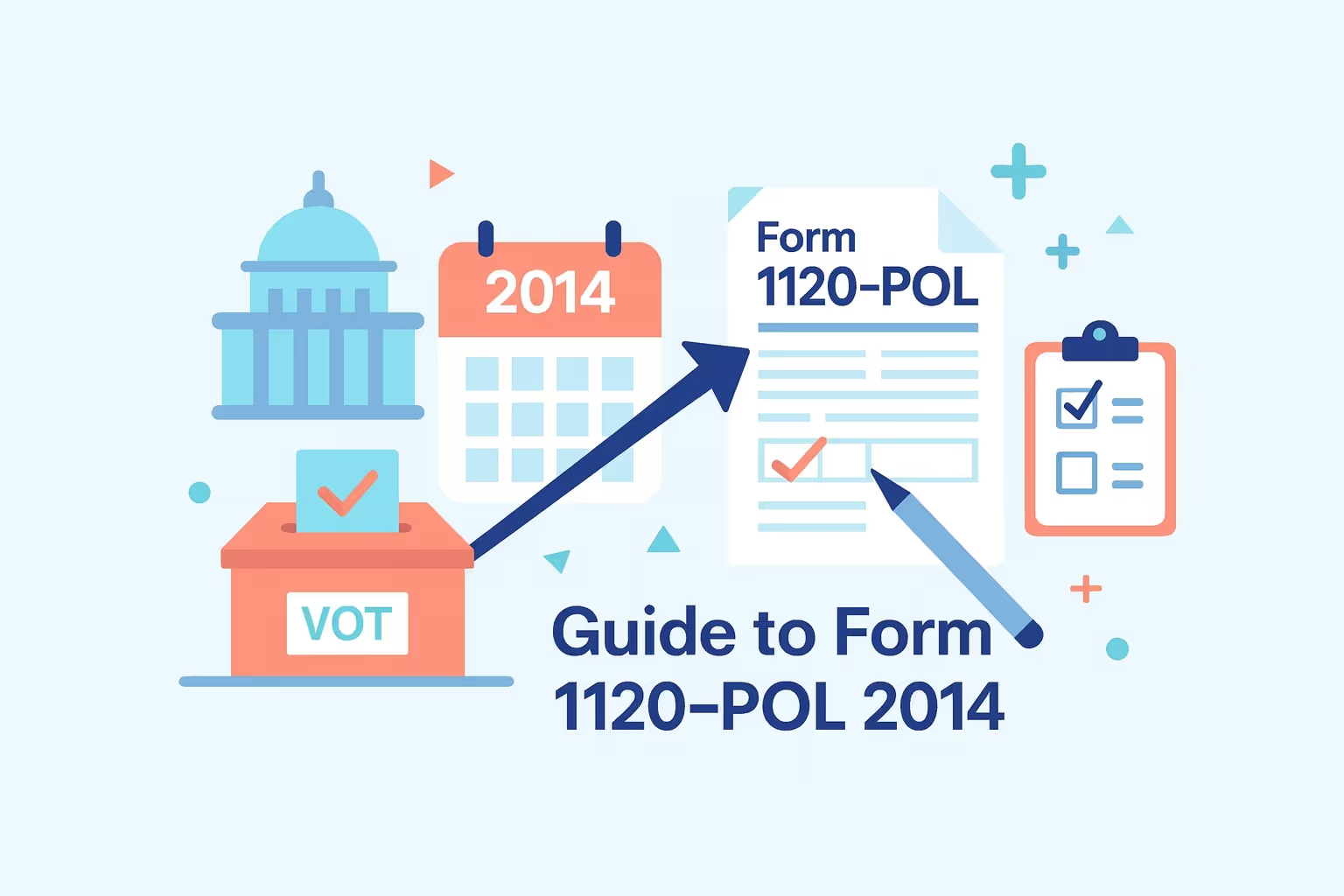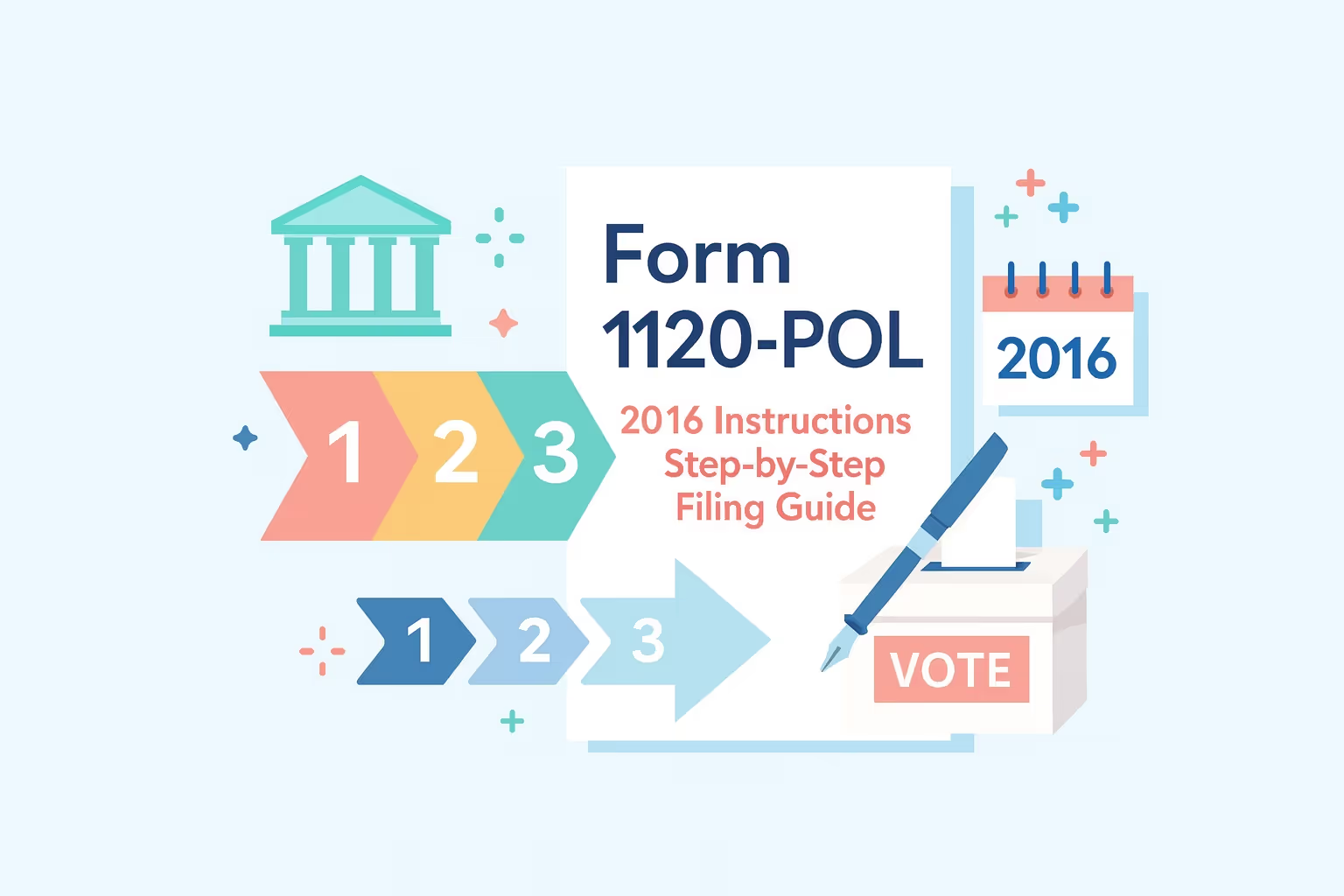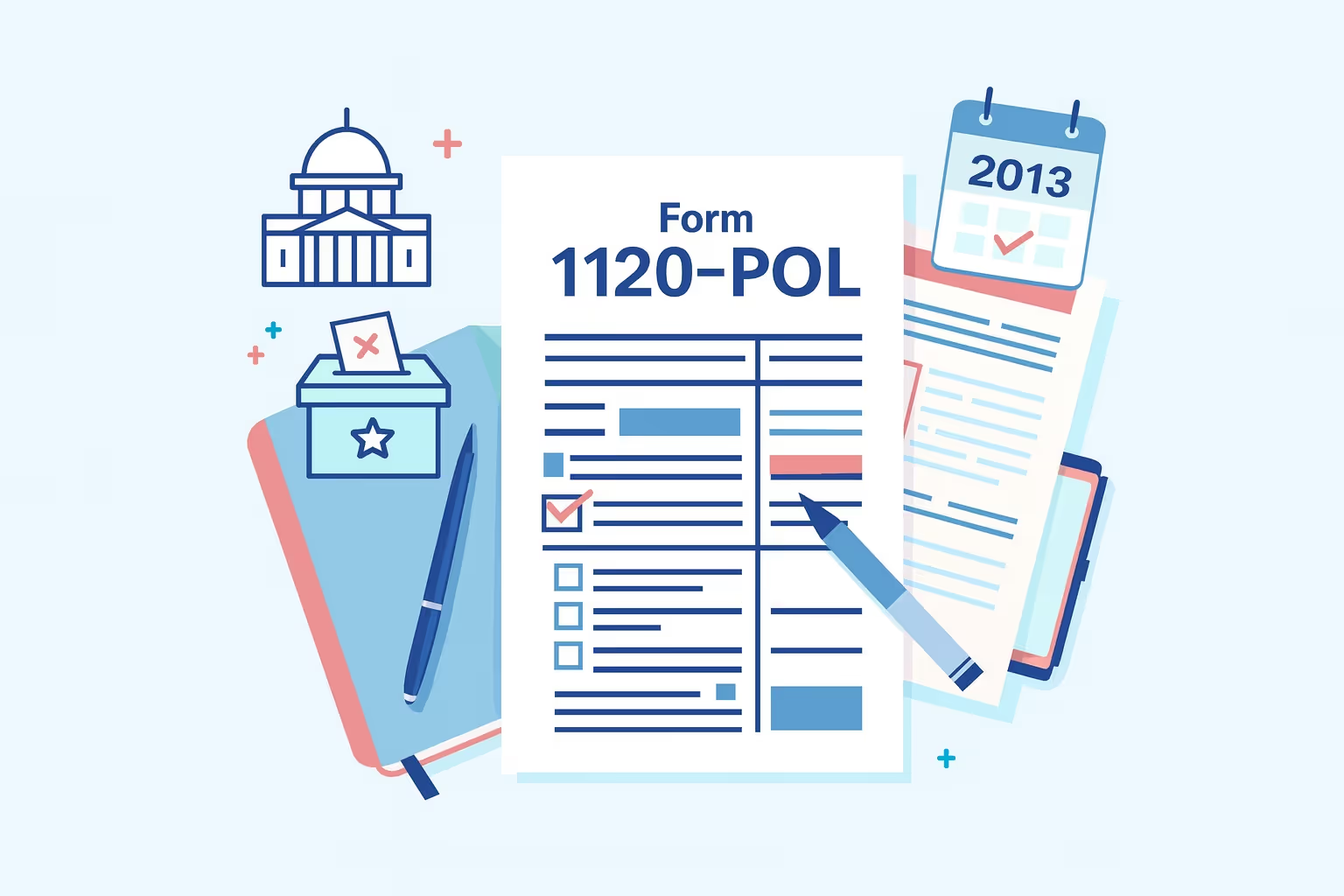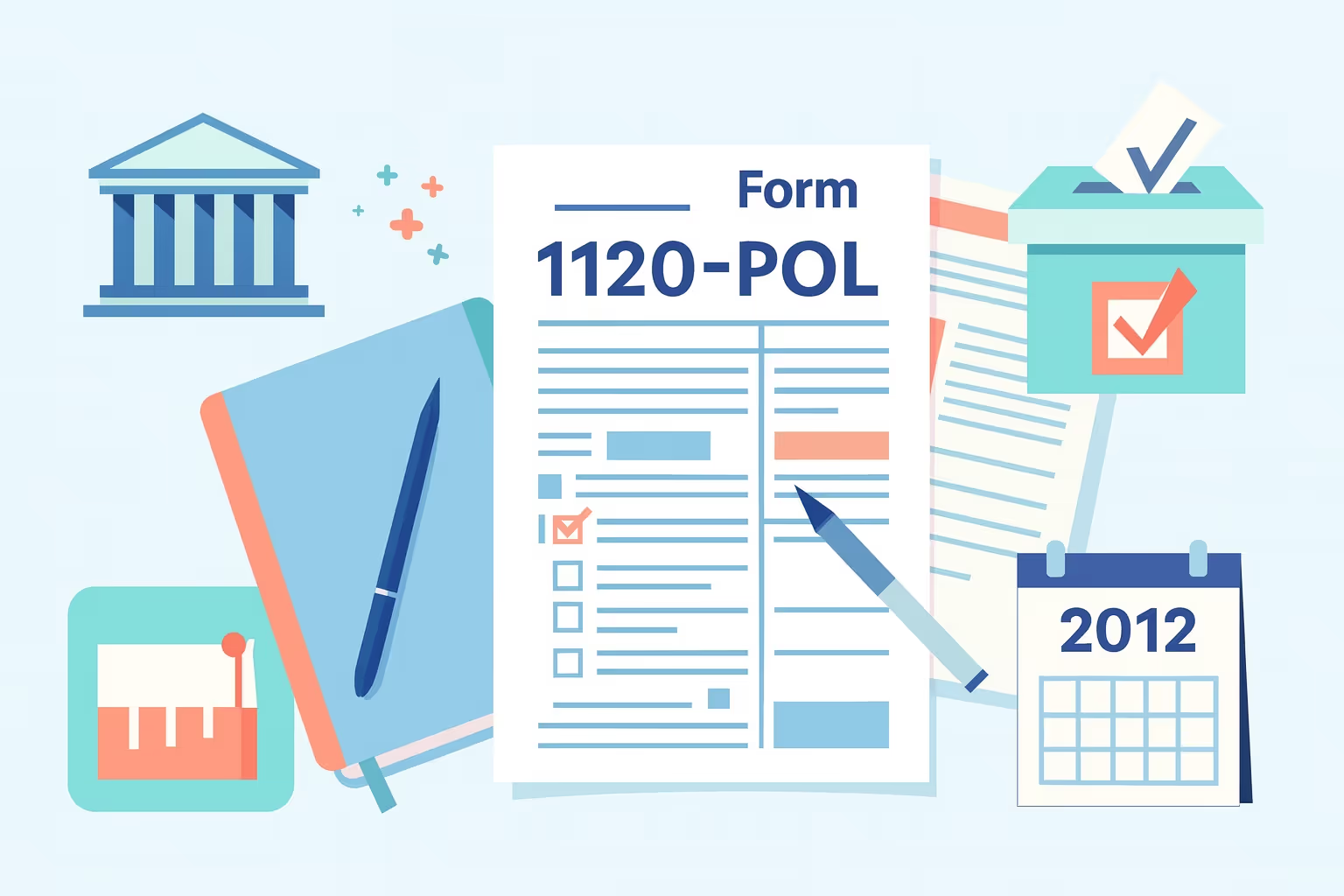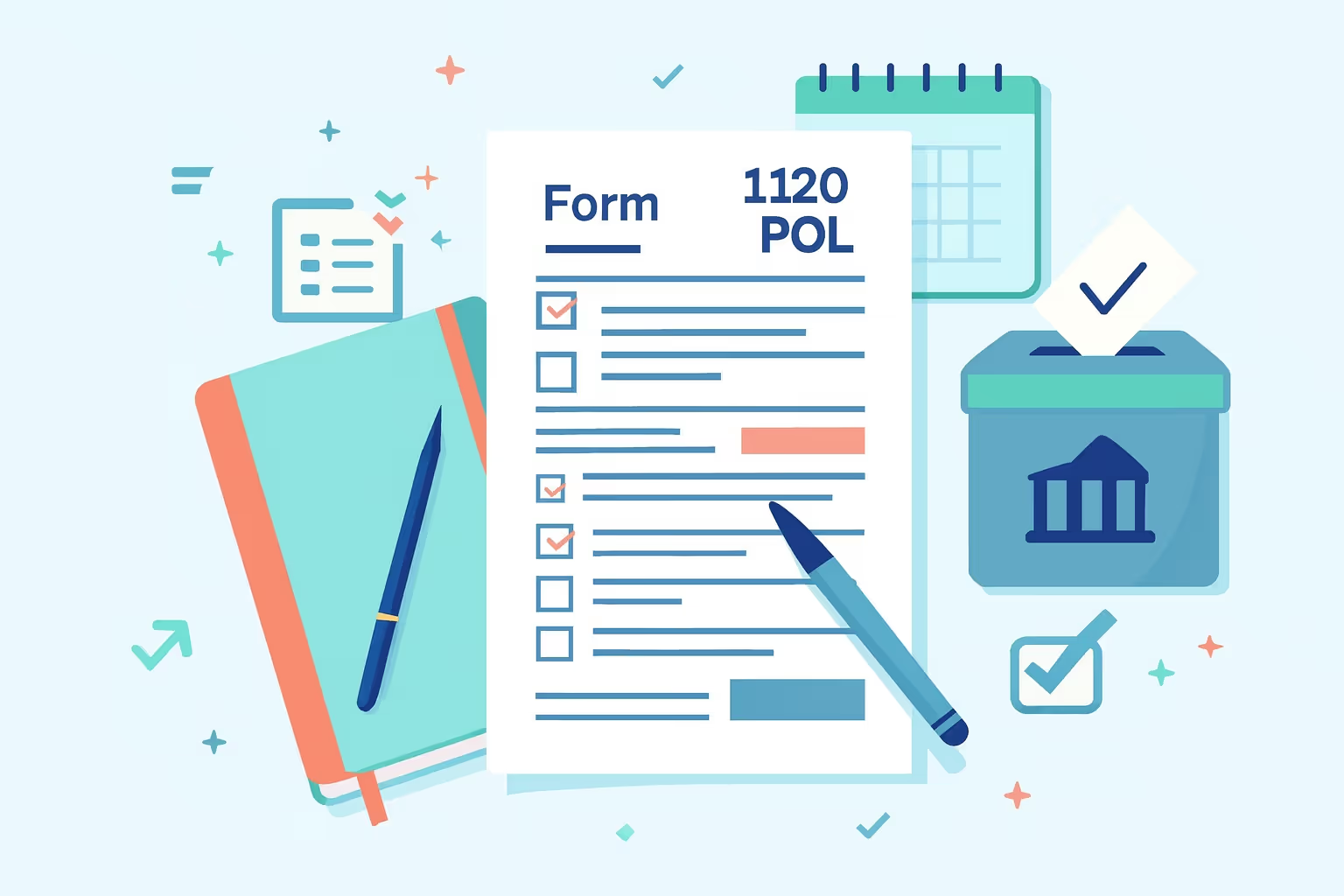
Filing Form 1120-POL can feel confusing for many political organizations, especially if you’re handling it for the first time. This Complete Guide for Form 1120-POL 2024 Instructions explains how to meet IRS filing requirements clearly and confidently. Form 1120-POL, officially titled U.S. Income Tax Return for Certain Political Organizations, is used by political groups and specific exempt organizations to report taxable income that isn’t directly related to political activities, such as investment income or business earnings.
Understanding how and when to file Form 1120-POL is essential for complying with federal tax law. Filing correctly helps ensure your organization reports all required income and applies any eligible tax credits or specific deductions, including the standard $100 deduction for political organizations. This guide breaks down every part of the 2024 form—from determining if your organization must file to completing each line and submitting your income tax return.
Whether you manage a small local committee or a larger national group, this step-by-step resource simply walks you through your federal tax obligations. You’ll learn to gather the proper documents, calculate tax liability, and choose between electronic or paper filing. By the end, you’ll understand how to accurately prepare and file your organization’s return, helping you stay in good standing with the Internal Revenue Service (IRS).
Understanding Form 1120-POL
Filing Form 1120-POL is essential for political organizations earning income outside their campaign or advocacy activities. This section explains the form, who must file it, and key terms that help you understand how the IRS classifies taxable income for specific political organizations.
What Is Form 1120-POL?
Form 1120-POL—the U.S. Income Tax Return for Certain Political Organizations reports income unrelated to political functions. Political committees, parties, and other exempt organizations must use it to report investment income, rental income, or business earnings unrelated to political purposes.
This form ensures compliance with the Internal Revenue Code and helps the IRS determine the amount of federal tax owed. The official filing instructions and details on eligibility are on the IRS website.
Who Must File Form 1120-POL
An organization must file Form 1120-POL if it meets any of the following criteria:
- It is a political organization with taxable income from non-political sources.
- It is an exempt organization—such as a 501(c)—that earns political organization taxable income under section 527(f)(1).
- It has a taxable income of $100 or more after deducting related expenses.
Example:
- If your organization earns $250 in interest from a bank account, and this income isn’t tied to political activities, you must report it.
- You may not need to file if your only income is political fundraising or membership dues.
Key Terms to Know
- Exempt Function Income: Income used directly for political purposes, such as campaign donations, membership dues, or ticket sales for political events. This income is not taxable.
- Political Organization Taxable Income: Income earned from non-political sources, including investments, rental properties, or unrelated business operations. This portion is subject to federal income tax.
Understanding these definitions helps organizations correctly identify which funds are exempt and which must be reported as taxable income under Form 1120-POL.
What’s New for Tax Year 2024
The 2024 version of Form 1120-POL includes several updates and clarifications to streamline credit reporting and modernize filing rules. These changes affect how political organizations complete their returns and should be considered carefully before submitting. You can review the official 2024 form and its line-by-line layout via the IRS PDF.
Updates to Line 21—Tax Credits Section
For tax year 2024, Line 21 now supports multiple separate credit categories instead of combining them into a single “other credits” line. The revised layout includes distinct lines for foreign tax credit, general business credit (and other eligible credits), and employer credit for paid family and medical leave. This change allows easier claiming and more precise accounting of each credit component.
Updated Electronic Filing Requirements
Under final regulation T.D. 9972, organizations that file 10 or more returns of any type in a calendar year must now e-file all applicable returns, which include Form 1120-POL. This threshold includes W-2s, 1099s, or other returns—not just the political tax return. The change is effective for tax years ending on or after December 31, 2023. If your organization meets that threshold, paper filing is no longer permitted.
Other 2024 Changes
- Section 965(a) Inclusion Exclusion: For 2024, amounts under § 965(a) are excluded, though prior-year installment payments under Form 965-B should still be attached if applicable.
- Carryforward Clarifications: Credit carry-forward and unused credits now have more precise instructions for applying against current tax liability.
- Stricter Recordkeeping Expectations: To match the more detailed credit reporting, organizations should ensure that supporting documentation is well organized and ready for audit or review.
These updates make it more important to follow instructions precisely and review all new line structures when completing your Form 1120-POL 2024 instructions.
Step-by-Step Instructions for Completing Form 1120-POL
The following steps outline how to complete Form 1120-POL accurately. Each step explains how to report income, apply deductions, and calculate taxes to ensure compliance with IRS requirements.
Step 1 – Determine If Filing Is Required
Start by confirming whether filing Form 1120-POL is mandatory. The requirement applies if the organization:
- Earned taxable income from non-political sources during the tax year.
- Reported taxable income of $100 or more after deducting related expenses.
- Operates as a political organization or an exempt organization with political organization taxable income under section 527(f)(1).
For example, an organization must file a lawsuit if it earned $200 in investment interest unrelated to political activity. In contrast, a group whose only income came from campaign contributions or membership dues generally does not need to file.
Step 2 – Gather the Required Information
Before completing the return, gather essential records.
- The Employer Identification Number (EIN) and official organization name are exactly as listed with the IRS.
- Year-end financial statements showing income received, investments, and other income.
- Expense records are directly tied to non-political income for accurate deductions.
- Provide copies of prior-year returns and any carry-forward schedules for credits or deductions.
- The documentation supporting all tax credits, including the foreign tax credit and the elective payment election amount, should be provided.
Accurate documentation helps confirm each reported figure and reduces the likelihood of filing errors.
Step 3 – Complete Each Section of the Form
- Part I – Income: Report taxable income unrelated to an exempt function, such as interest, dividends, or rental income. Include any non-exempt function expenditures. The total of these entries becomes the organization’s total income.
- Part II – Deductions: Deduct only expenses directly connected to producing taxable income. General administrative or political expenses are not deductible unless directly linked to the taxable activity. The result is the organization’s total deductions.
- Part III – Tax Computation: Subtract the specific deduction of $100 (not available for newsletter funds) from taxable income. Multiply the remaining amount by 21% to determine the tax liability. Include any net investment income and adjustments as required by the IRS. Maintain detailed records to support every calculation.
Step 4 – Apply Credits and Calculate the Final Tax
After computing tax, claim eligible tax credits on Line 21, such as the foreign or general business credit. Subtract the total credits from the calculated tax to determine the total tax after credits. Next, report payments and deposits, including tax deposited with Form 7004, credits for tax paid on fuels, or any elective payment election amount. The difference between tax owed and payments results in the balance due or overpayment.
Step 5 – Review Before Submitting
Review the return carefully to confirm accuracy and completeness.
- Verify that the EIN, organization name, and calendar or fiscal year are correct.
- Ensure all accompanying schedules and other forms are attached and labeled correctly.
- Recheck calculations for income, deductions, credits, and total tax.
- Confirm readiness for electronic filing and ability to retransmit rejected returns if necessary.
- If you are filing by mail, ensure you have the correct address for your location's Internal Revenue Service Center.
- File an amended return if a mistake is found after submission.
Following these structured steps produces a complete and compliant return that accurately reflects tax paid and meets all IRS filing requirements.
Filing Options and Deadlines
Political organizations can file Form 1120-POL electronically or by paper, depending on their filing situation. Knowing which option applies and meeting the IRS deadlines helps maintain compliance and prevents costly penalties.
Electronic Filing (E-file)
The IRS requires electronic filing for organizations that submit ten or more returns within a calendar year. This rule, issued under T.D. 9972, applies to all return types, such as W-2, 1099, and employment tax forms. Political organizations that meet this threshold must electronically file Form 1120-POL.
The benefits of e-filing include:
- It reduces errors because IRS-approved software flags missing or incorrect information before submission.
- It provides instant confirmation that the IRS has received and accepted the return.
- It speeds up processing, which allows faster posting of payments or refunds.
- It enhances security through the encrypted transmission of sensitive data.
Organizations using e-filing should select IRS-approved software that meets all security and accuracy standards.
Paper Filing
Paper filing remains available for smaller political organizations or those granted a hardship waiver by the IRS. Returns must be mailed to the appropriate Internal Revenue Service Center according to the organization’s location. Foreign filers should send their returns to the Ogden, Utah, address listed in the official IRS instructions.
When submitting a paper return:
- Use black ink and print clearly on official IRS forms.
- Avoid using correction fluid or handwritten edits that obscure information.
- Do not include payment with the return; payments should be made electronically through the approved IRS system.
- Retain copies of all filed materials for organizational records and potential audits.
Key Deadlines for 2024
- For calendar-year organizations, Form 1120-POL is due April 15, 2025.
- For fiscal-year organizations, the due date is the 15th day of the fourth month after the tax year ends.
- Organizations that need additional time may file Form 7004 to request an automatic six-month extension.
Filing on time ensures compliance with IRS requirements and avoids interest charges or the minimum penalty for late submission.
Payment Methods and IRS Compliance
Understanding how to pay taxes correctly is essential to filing Form 1120-POL. Political organizations and specific exempt organizations must use approved payment methods that ensure accuracy and compliance with federal rules. These payments apply to income reported under business income tax or specific business income tax categories, depending on the organization’s activities.
How to Pay Your Taxes
The IRS requires an electronic funds transfer for all federal tax deposits. Payments must be made through the Electronic Federal Tax Payment System (EFTPS), a secure service managed by the Department of the Treasury.
Payments submitted through EFTPS must be scheduled by 8:00 P.M. Eastern Time the day before the due date. Organizations in a foreign country should use a same-day wire payment arranged through their financial institution.
Additional payment guidelines include:
- Payments should not be mailed with the return.
- Confirmation records from EFTPS should be retained for proof of payment.
- Any owed taxes must be settled before the due date to prevent interest and penalties.
Compliance Considerations
All tax-exempt and non-exempt political organizations must report income accurately, including gross income, annual gross receipts, and undistributed capital gains. Each form accepted and approved by the IRS should follow official instructions and include the Paperwork Reduction Act notice.
Organizations with financial accounts tied to a qualified opportunity fund or local public office activity must ensure their reporting complies with nonprofit tax filing requirements. Maintaining detailed records confirms that the organization remains exempt under federal law while meeting all filing and compliance obligations.
Supporting Forms and Attachments
Completing Form 1120-POL may require additional documentation to verify income, deductions, and other tax details. These supporting materials allow the IRS to confirm compliance for the calendar tax year and ensure accurate reporting by specific exempt organizations. Every form approved by the IRS should be reviewed for accuracy, completeness, and consistency before submission.
Required Attachments
Organizations may need to attach one or more of the following documents when submitting Form 1120-POL:
- Form 4136—Credit for Federal Tax Paid on Fuels: This form applies when claiming fuel-related tax credits. If applicable, it must be filed with a completed 1120-POL.
- Form 965-B – Deferred Foreign Income Tax Payment Agreement: Organizations with prior-year Section 965 elections should include this form, especially if reporting a domestic corporation’s GILTI (Global Intangible Low-Taxed Income).
- Form 8886—Reportable Transaction Disclosure Statement: Attach this form if any of the organization's assets are in a reportable or listed transaction.
- Qualified Investments: Records detailing qualified investments or related foreign holdings should be included to support income or deduction claims.
- Annual Statement: A summary report outlining taxable and non-taxable income for the year helps the IRS confirm compliance during an internal audit.
Each attachment must include the organization’s name, Employer Identification Number (EIN), and reference to the section of the form it supports.
Related Forms for Political Organizations
- Form 8871 – Political Organization Notice of Section 527 Status: This form notifies the IRS of an organization’s existence and establishes eligibility under Section 527.
- Form 8872–Political Organization Report of Contributions and Expenditures: This report details income, expenditures, and contributors.
- Form 990 or 990-EZ: Larger political organizations with significant annual gross receipts use these forms to disclose operations and financial activities.
Maintaining clear, well-labeled attachments ensures smoother processing and accurate review. Although the IRS does not offer a money-back guarantee, consistent documentation supports transparency and accurate shareholder calculation results during compliance reviews.
Common Filing Mistakes and How to Avoid Them
Even well-organized political groups can make errors when completing Form 1120-POL. Many mistakes result from misunderstanding eligibility rules, missing required details, or overlooking updated IRS instructions. Careful preparation helps tax-exempt political organizations and specific exempt organizations remain compliant and avoid penalties. The following are common errors and ways to prevent them.
Reporting Errors
- Incorrectly reporting exempt income: Some filers mistakenly include political contributions or membership dues as taxable income. Under certain business income taxes, only income unrelated to political activity, such as investment earnings, should be reported.
- Omitting foreign or investment information: Organizations with foreign trusts or foreign financial interests must disclose this activity on the appropriate forms. Failing to do so can lead to compliance reviews or penalties.
- Misstating the aggregate income or deductions: The IRS expects total figures to match documentation. Review the calculations to ensure the totals are accurate and consistent across all schedules.
Filing Process Errors
- Submitting incomplete forms: Every organization exempt under Section 527 must complete all required sections. Filers should use current forms from the IRS website and verify that each form easily matches the latest revision year.
- Forgetting to apply for an automatic extension: Organizations that cannot file by the deadline should request an automatic extension using Form 7004 to avoid the minimum penalty for late filing.
- Not updating organizational details: A material change, such as a new address or a change in structure, requires an update using Form 8822-B. Failing to report updates may cause correspondence delays or rejected filings.
How to Avoid Mistakes
- Review each completed return carefully for accuracy and completeness.
- Verify that financial data aligns with the organization’s books, including aggregate amount totals.
- Retain copies of supporting documentation for all reported income, deductions, and credits.
Consistent review and recordkeeping ensure that filings are correct, timely, and compliant with IRS standards.
Zero or Dormant Year Filings
Some political organizations may have years with no taxable income or reportable activity. Form 1120-POL is not required if taxable income is zero or less after the $100 specific deduction. However, voluntary filing during such years can still provide essential compliance benefits.
Key points to remember include:
- Filing in a zero-activity year begins the three-year statute of limitations period for IRS review and establishes a consistent filing record.
- Submitting a return allows the organization to report carry-forward or credits that may apply in later tax years.
- Maintaining an active Employer Identification Number (EIN) ensures continued recognition by the IRS.
- Dormant organizations should keep basic financial records and notify the IRS of any changes in address or structure.
- When operations resume, the organization should verify filing requirements and confirm compliance with all federal tax obligations.
Tips for First-Time Filers
First-time filers of Form 1120-POL can make the process easier by organizing records early and following IRS guidelines carefully. Proper preparation helps ensure accuracy, compliance, and stress-free submission.
Helpful tips for new filers include:
- Obtain an Employer Identification Number (EIN): Every political organization must have an EIN before filing. Apply online through the IRS to promptly receive your refund.
- Separate political and non-political income: Maintain distinct accounts for exempt and taxable activities to simplify reporting and prevent errors.
- Use reliable recordkeeping methods: Track income, expenses, and supporting documents throughout the year to prepare accurate returns.
- Rely on IRS-approved software: Using authorized software ensures the form is completed and transmitted securely, and errors are identified before submission.
- Monitor filing deadlines: Mark calendar reminders for the due date and any automatic extension requests.
- Consult official IRS resources: To stay compliant, review the most recent instructions and updates directly from the IRS website.
Following these steps helps political organizations file with confidence, maintain accuracy, and uphold compliance with federal tax requirements.
Frequently Asked Questions (FAQs)
What is the due date for filing Form 1120-POL?
The due date for filing Form 1120-POL depends on the organization’s tax year. For a calendar year, the return is due April 15, 2025. For those using a fiscal year, the return is due on the 15th day of the fourth month after the tax year ends. Filing on time helps avoid interest charges and the minimum penalty for late submission.
Which organizations are considered specific political organizations required to file?
The IRS defines specific political organizations as entities formed under Section 527 that receive income not directly tied to political activities. These include campaign committees, political parties, and advocacy groups. If such organizations earn investment or business income exceeding $100, they must file Form 1120-POL to report taxable income accurately and comply with federal requirements.
How is federal tax calculated on Form 1120-POL?
The federal tax for political organizations is calculated at a flat 21% rate on taxable income after applying the $100 specific deduction. Only income unrelated to political purposes—such as interest, dividends, or rental income—is subject to taxation. Correctly identifying taxable versus exempt income ensures the organization complies with IRS rules and minimizes errors during review.
What is exempt function income, and how is it treated?
Exempt function income refers to funds used directly for political purposes, including campaign contributions, membership dues, and ticket sales for political events. This income is not taxable and should not be reported on Form 1120-POL. Only non-political income, such as investment or unrelated business income, must be included when calculating taxable income for the organization.
What are the rules for calendar year filers?
Organizations that operate on a calendar year must use January 1 through December 31 as their reporting period. The IRS requires these filers to submit Form 1120-POL by April 15 of the following year. Fiscal-year filers, however, calculate deadlines based on their chosen accounting period. Selecting the correct year ensures timely filing and consistent recordkeeping.











